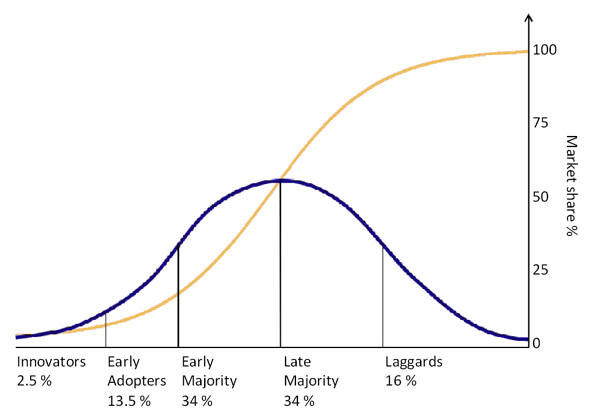
The diffusion of innovations according to Everett Rogers. With successive groups of consumers adopting the new technology (shown in blue), its market share (yellow) will eventually reach the saturation level. Source: Wikipedia.
Remember when you took your first driving lesson? Fasten your seat belts… Check your mirrors… Adjust your seat… Obey speed limits… Decipher a slew of signs. It was all a bit overwhelming at first, but with a little time and experience behind the wheel, it became old hat.
The same can be said for technology. While it can be daunting – even intimidating at first glance – after a while it becomes second nature. That is why the results of a recent study by Ipsos Mendelsohn come as no surprise.
The study in question found that, along with the many perceived benefits, affluent consumers described their everyday lives as “more complicated” and “more stressful” because of technology. There are two ways you can look at this:
Being more of a pragmatist, I’m inclined to go with the latter. As many are early adopters, I’m sure the newness factor is playing into the perceived “stress” being felt by affluent consumers today. They are being assailed by a large crop of new devices and platforms all at once – many that are attempting to replace familiar old standards that have been around for years (mobile phones, personal computers) and even centuries (printed books). If this same group is re-surveyed one year from now, after the technology in question has started to streamline itself (read: after overlapping products/platforms start to fall off), I’m certain the results will be very different.
Technology isn’t going to stop moving forward, folks. If anything, product innovation is only going to move faster in the coming years. True adoption and acceptance may take longer in some instances, but if there is merit to the product or platform, it will happen. My advice is to simply buckle up and enjoy the ride.